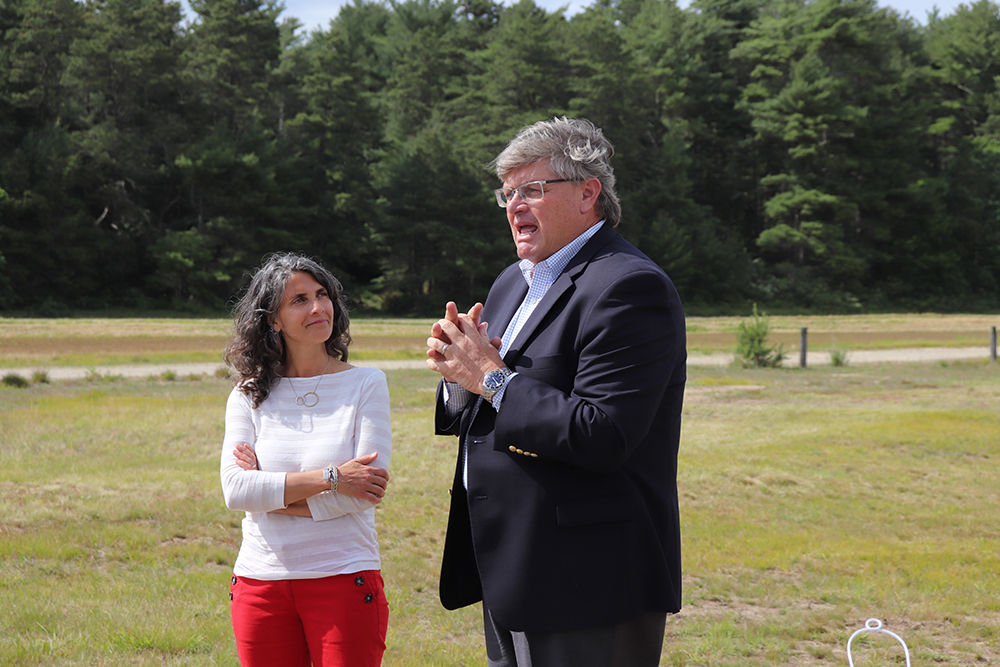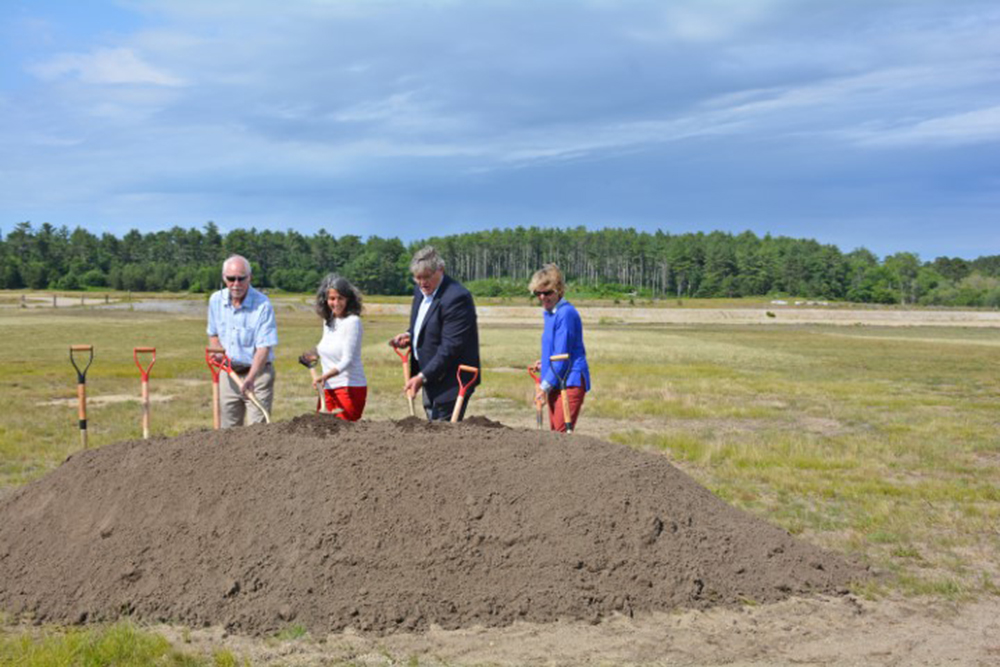The A.D. Makepeace Company partners with the Marion Institute to develop a Farm to Food Relief program

private groundbreaking ceremony.
Plymouth, MA The A.D. Makepeace Company (ADM) is partnering with the Marion Institute to develop a Farm to Food Relief program to grow food for those in need. Known as The Neighborhood Farm at Frogfoot, the six-acre farm will be located on ADM property in a remote area on the Plymouth-Wareham town line. On the site, the Marion Institute will grow food for those in need and make more local food available to food relief programs. Members of the two organizations’ boards of directors and staffs celebrated the start of the project with a private reception and groundbreaking on site last week.
“This is a little bit of a dream come true for me,” said Jim Kane, president and CEO of the ADM. He told of his grandmother and her family needing food assistance in the 1920s following the death of her father in a car accident. “How in 2023 there can still be people going to bed hungry is just beyond me.”
Liz Wiley, executive director of The Marion Institute, agreed that the project is the fulfillment of years of effort. “We are grateful to the A.D. Makepeace Company for their support and partnership in bringing this vision to life,” she said.
Both Kane and Wiley credited Chris Makepeace, a descendent of ADM founder Abel Makepeace, former company president, and current board member, for championing the project.
In the Marion Institute’s recently published Food System Assessment for Southeastern MA, a consumer survey indicated that the hardest to get food items are affordable meat and seafood, fresh fruits, and vegetables. Being able to address this issue by increasing access to fresh, healthy, culturally relevant foods and prepared meals at low-to-no cost will not only address the high rates of food insecurity we have in our region, but will do it in a nutritionally secure way.
“Our nation’s broken food system is characterized by an abundance of cheap, inflammatory, nutrient-depleted, immune suppressing, ultra-processed foods,” Wiley said.
“Unfortunately, our current food relief system relies heavily on these shelf-stable products which ultimately negatively impact public health.”

Kane noted that his wife, state rep. Hannah Kane, is a member of the Massachusetts Food Policy Council and a strong advocate for food and nutrition programs. Through a multi-year, no-cost lease agreement, the Marion Institute will create, develop, and manage a Farm to Food Relief Program on ADM property. The shared purpose of the Neighborhood Farm at Frogfoot is to increase the availability of local food to area food relief programs in Southeastern MA by growing fresh produce directly for food relief. The initiative will also allow the Marion Institute to launch a regional Gleaning Program that will increase the amount of local food available to area food relief programs. A gleaning program is based on the notion that every year, thousands of pounds of food goes to waste in the field because farmers either do not have the labor to harvest a crop or the market to sell it too. The Marion Institute’s trained gleaning volunteers will “rescue” this food before the crop is lost, delivering it to a local food pantry or processing center for food insecure individuals and families. Both activities will be developed on a foundation of social justice, regenerative farming practices, education, and equitable access to fresh, local, culturally-relevant foods. The Marion Institute’s Southcoast Food Policy Council connects and advocates for local food producers, consumers, and community leaders who seek policy and systems that strengthen our regional food system, improve community health, and eliminate food insecurity. The Council is one of several health-related initiatives for the nationally known nonprofit organization, whose vision holds that “optimal health is a basic human right, not a privilege.”
Newmark negotiates sale of 10 Liberty Sq. and 12 Post Office Sq.


How COVID-19 has impacted office leasing - by Noble Allen and John Sokul

Five ways to ruin a Section 1031 Like-Kind Exchange - by Bill Lopriore

Make PR pop by highlighting unique angles - by Stanley Hurwitz








